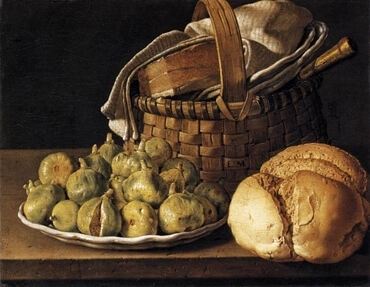15
Trubite u trubu na Sionu! Sveti post naredite, oglasite zbor svečani,

In the Bible, a fig tree represents the "natural", outward life of a person in the world, and the thoughts and feelings directly connected it. Our natural selves have a tendency to be drawn toward evil, seduced by bodily pleasures and engaged in merely factual thinking. If our natural level is connected to a more elevated interior state, though, it can be engaged in doing the work of being good and gathering the knowledge that can be built up into truth. This "natural good" is represented by the figs themselves, the fruit borne by the tree. It's interesting how there is a hierarchy among the most common fruits in the Bible. Olives represent the most exalted human state, which is called "celestial" and is driven by love of the Lord. Grapes represent the next level, which is called "spiritual" and is led by truth from the Lord and love of the neighbor. Figs represent the lowest level, the natural. This makes sense if you think about it. Olives produce olive oil, which is not only food but can also be burned, and fire represents love. Grapes produce wine, which was prized in ancient times and which represents spiritual truth. Figs are food, giving the body energy to work.
164. "'I will come upon you like a thief, and you will not know at what hour I will come upon you.'" This symbolically means that the things of which their worship consists will be taken from them, without their knowing when or how.
This says that the Lord will come like a thief because a person engaged in a lifeless worship has the outward good of worship taken from him. For lifeless worship has some good in it, inasmuch as the worshipers think about God and eternal life. Still, good without its truths is nevertheless not good, unless it is merit-seeking or hypocritical, and evils and falsities take that away, like a thief. This occurs progressively in the world, and totally after death, and moreover without the person's knowing when or how.
It is said in attribution to the Lord that He will come like a thief, but in the spiritual sense the meaning is that hell will take something away and rob people of it. The case here is the same as when the Word says that God does evil to a person, lays him waste, takes revenge, becomes wrathful, and leads into trial or temptation, when in fact it is hell that does these things; for it is so stated in accordance with the appearance to mankind.
In Matthew 25:26-30 and Luke 19:24-26 it may be seen that a talent or mina with which a person is to do business is taken from him if does not make a profit by it. To do business and make a profit means, symbolically, to acquire for oneself truths and goods.
[2] Since the taking away of goodness and truth from people engaged in a lifeless worship comes about as though by a thief in the dark, therefore in the Word it is sometimes likened to a thief, as in the following places:
Behold, I am coming as a thief. Blessed is he who watches and keeps his garments, lest he walk naked... (Revelation 16:15)
Watch therefore, for you do not know at what hour your Lord will come. Know this, that if the master of the house had known at what hour the thief would come, he would certainly have watched and not allowed his house to be broken into. (Matthew 24:42-43)
If thieves have come to you, if robbers by night - oh, how you will be cut off! - will they not steal till they have enough? (Obadiah v. 5)
They run to and fro in the city, they run on the wall; they climb into the houses, they enter through the windows like a thief. (Joel 2:9)
They have concocted a lie, and a thief comes, and a mob spreads outside. (Hosea 7:1)
Do not lay up... treasures on earth..., but... in heaven..., where thieves do not come and will not steal. (Matthew 6:19-20)
A person should watch and not know the hour at which the Lord comes in order that he may think and act as though of himself, thus in freedom in accordance with his reason, and not have fear interject anything. For everyone would be fearful if he were to know. Moreover, whatever a person does of himself in freedom remains to eternity, while what he does out of fear does not remain.